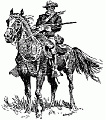The question I have is what are relevant topics for a curriculum for a staff officer course equivalent to the US Army the Command and General Staff Course or the US Marine Command and Staff Course? What are the most effective educational methods? The course serves the armed forces three small NATO nations which have to seriously consider territorial defense against conventional attack by a large power as well as irregular threats and are sending out expeditionary forces to fight coalition/alliance small wars. There are international students from large NATO and non Ė NATO nations in the course as well. I am involved in curriculum planning and would like some ideas on what an eleven month course for majors should include. The course covers military theory, leadership, operational planning process, peacekeeping - peace support operations, counterinsurgency, operational trends, defense planning, civil emergency management, ethics, international law and international relations. The international relations teaching in past courses have been heavy in lectures in political science theory. I question how relevant lectures on political science are. How many comparative theories on international relations do staff officers really have to know about? Perhaps itís good to have some political science, but in more moderation as in our case it takes about 25% of the course time. I wonder if it could be time better spent, perhaps on historical case studies carried by the students and guided by instructors to develop critical thinking on complex operational situations. Any thoughts on what other topics should be covered as well as what educational methods are best?










Bookmarks